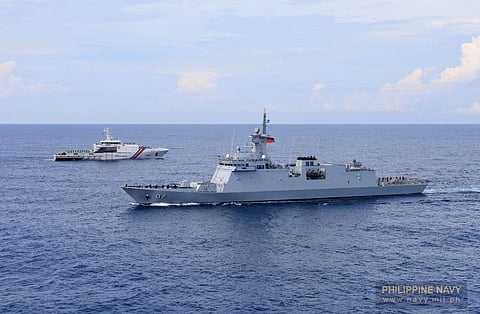
- NEWS
- the EDIT
- COMMENTARY
- BUSINESS
- LIFE
- SHOW
- ACTION
- GLOBAL GOALS
- SNAPS
- DYARYO TIRADA
- MORE

SUBIC BAY FREEPORT — As the Philippine Navy strengthens its fleet, two ship meetings were conducted off the coast of Zambales, marking a significant event for both the PN and the Philippine Coast Guard.
On 8 September 2025, the Philippine Navy’s second Miguel Malvar-class frigate, the future BRP Diego Silang (FFG-07), carried out a coordinated meeting procedure with the Philippine Coast Guard’s BRP Gabriela Silang (OPV-8301) as the former sailed in Philippine waters.
The encounter was notable as the Commander of the Philippine Fleet, Rear Admiral Joe Anthony Orbe PN, oversaw the event while his son, Coast Guard Ensign Joshua Orbe, was on board the BRP Gabriela Silang. The younger Orbe joined the operation as part of his ongoing ship familiarization training — making it a father-and-son reunion at sea.
The historic ship meeting also carried deeper meaning. In Philippine history, Diego and Gabriela Silang led the 1762–1763 revolt against Spanish rule. After Diego’s assassination in 1763, Gabriela took over the movement until her capture and execution.
More than two and a half centuries later, ships bearing their names came together off Zambales — a region now facing heightened geopolitical tensions. Beyond a routine naval exercise, the encounter honored the Silangs’ legacy, symbolizing heroism and unity as the Navy and Coast Guard continue safeguarding national sovereignty.
The meeting also reinforced fleet interoperability, operational readiness, and the Navy’s modernization drive, while highlighting the human side of service and the dedication of maritime officers across generations.
On the same day, the future BRP Diego Silang also carried out a meeting procedure with the BRP Jose Rizal (FF-150), approximately 14 nautical miles northwest of Botolan, Zambales.
The soon-to-be BRP Diego Silang will undergo final preparations, acceptance procedures, and commissioning before formally joining the Philippine Navy’s active fleet. Once commissioned, the second Miguel Malvar-class frigate is expected to bolster operational readiness, enhance maritime domain protection, and strengthen the country’s ability to uphold a free, secure, and rules-based international order.
